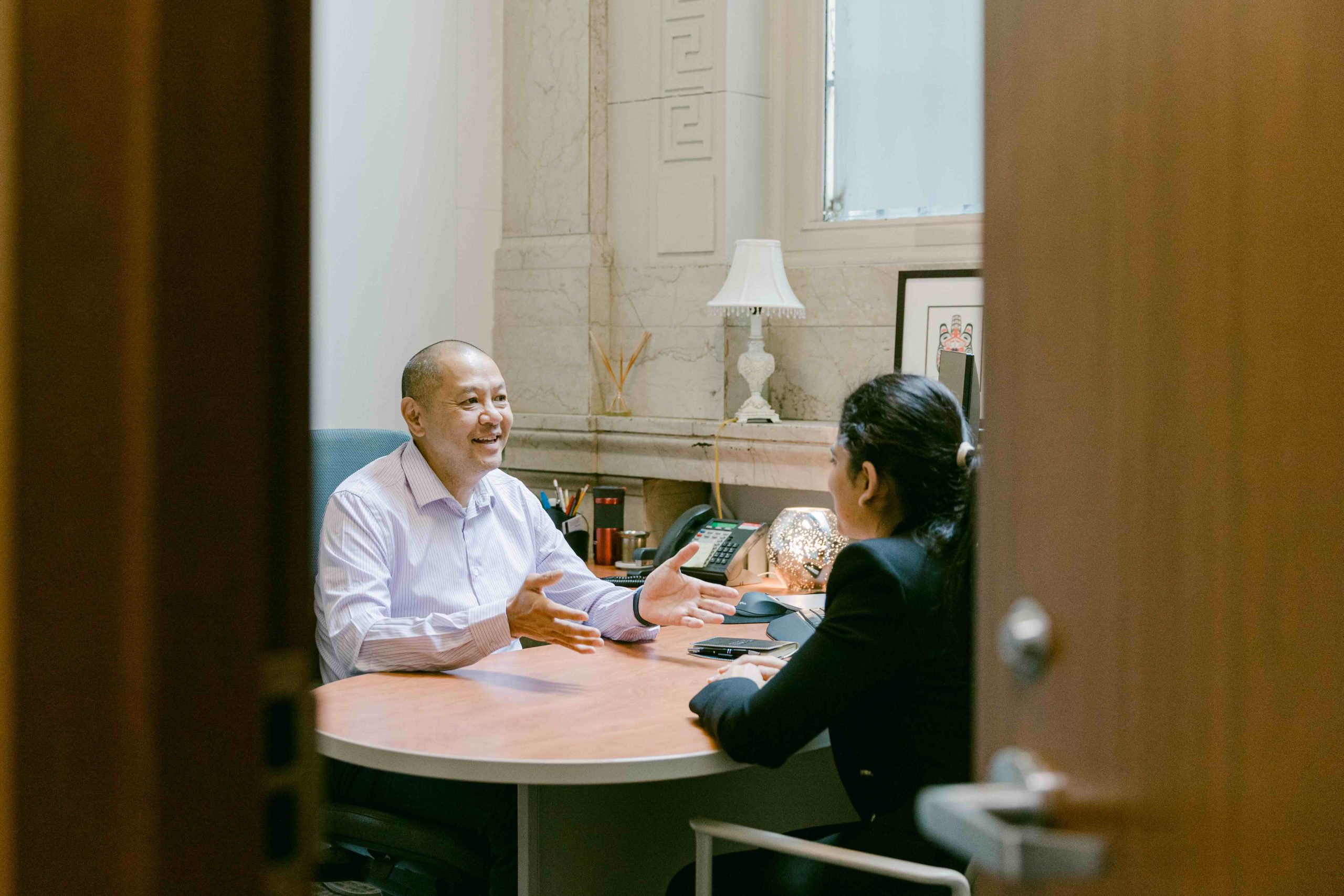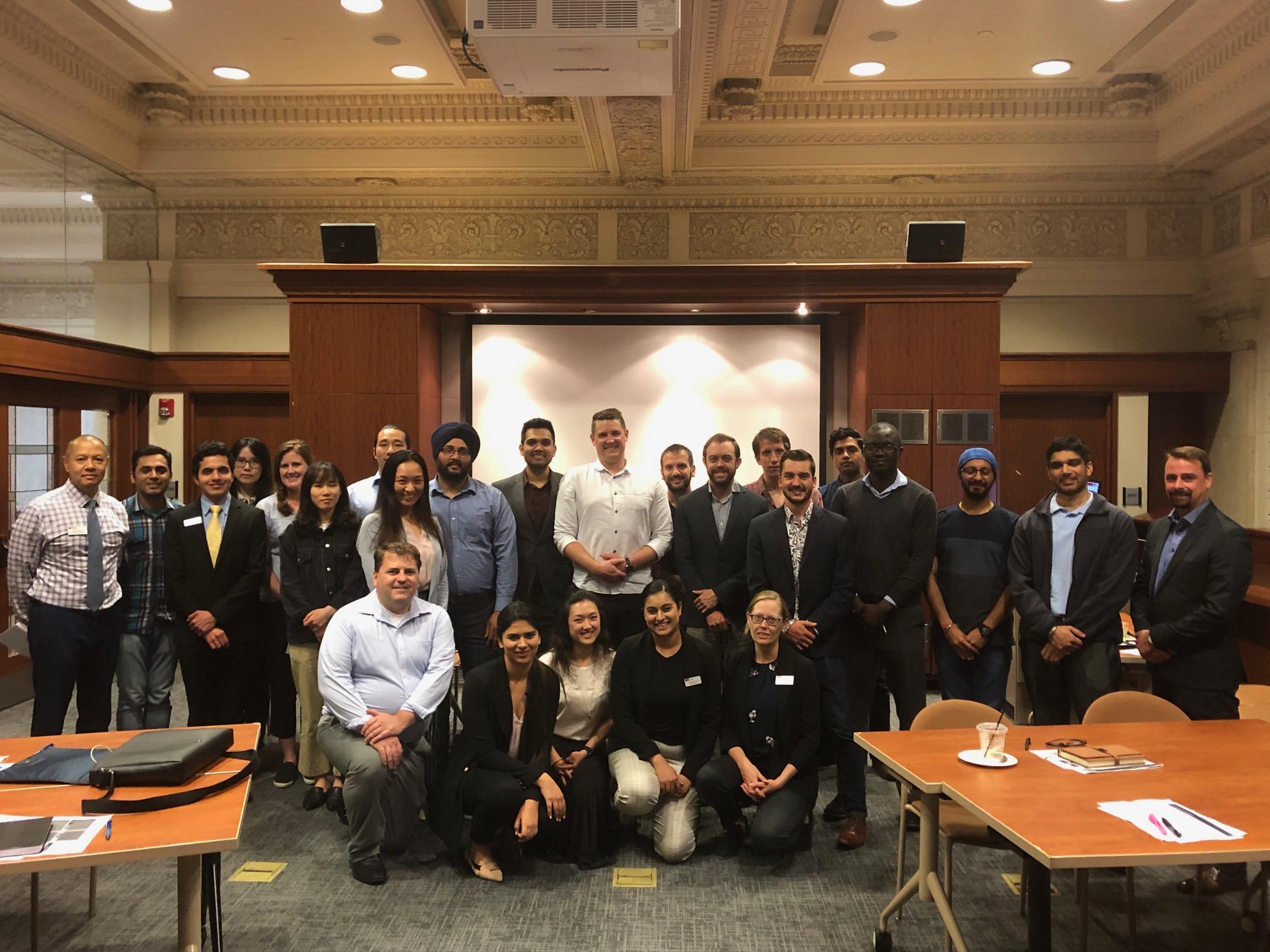Introduction
When I first began my journey at the Beedie School of Business, I had numerous conversations with alumni who consistently credited one individual with starting them off on their successful career paths—Doug Leong. Whether through mentoring or introducing them to key contacts, Doug’s impact on their professional journeys was profound. With this in mind, I was eager to sit down with Doug, the Senior Associate Director of Career Operations at SFU, to learn more about his experiences, challenges, and vision for the future of the Career Management Centre (CMC).

Doug advising a student
Q: Thank you for taking the time today, Doug. Can you start by sharing more about your professional journey and what led you to your current role?
Doug: I’ve been in education for over 25 years now. My career started with teaching in the public school system, where I’ve taught everything from grades four to twelve. After that, I worked with youth in a non-profit organization, focusing on youth at risk of joining gangs. I was a program manager who led various initiatives to help students avoid gang involvement. After working with youth, I wanted a career pivot away from education, so I went into the corporate sector and worked as a business analyst for a national company. This lasted for 2 years. However, after working in corporate I realized that even though the money was a lot better than in education, it wasn’t fulfilling for me. I always valued giving back to people, and supporting students was the reason I got into education in the first place.
I was burnt out from working with youth, but wanted to remain in Education. I started teaching classes at a private college, which marked the beginning of my career in higher education. From there, I moved into administration working in Recruitment and Admissions. Eventually, I was asked to start and develop the career department at a private college because they didn’t have a career center. This is how I began my career in career services. I worked at this private college for 14 years and then moved to SFU to work at the Beedie career center.
Q: Can you recount any particularly memorable success stories or cohorts from your time at SFU?
Doug: One of the most memorable cohorts was the 2019 cohort. They had to deal with the transition to online courses and services during the COVID-19 pandemic. Supporting nearly 50 students in finding jobs during a time when companies were not hiring was a huge challenge. However, by building strong relationships with employers and adapting our services, we were able to support all those students find positions.
Q: Many students, including myself, are looking to pivot our careers through an MBA. What advice do you have for successfully making such a transition?
Doug: Over the past nine years, I’ve seen many MBA students pivot into different careers. The biggest factor is the students’ motivation and what they do to reach their goals. Often, it’s the importance of networking and building relationships. In addition, students who have been successful in pivoting are the ones who understand the career and job function they want, the industry they aim to enter, and the steps needed to get into that role. They often do a lot of extra work/courses outside of their MBA classes to gain certain certifications. The MBA definitely supports their career transition, but there may be specific hard skills that students may need to develop or upgrade in order to work in a particular functional role. It’s the extra work that students do that helps them pivot in their careers.
Q: Have you seen any innovative strategies from students that have been particularly effective in securing jobs?
Doug: One instance that stands out to me was a student who conducted an informational interview with a company. He asked about the challenges the company was facing and then reflected on them. About a week later, he went back to the company, and said, “I remember we were talking about the challenges you were facing. In my MBA courses, this is what I’m learning, and here are some ideas that may help solve your challenges”. The employer was impressed and asked him to write a business proposal. Eventually, he secured an internship by doing that. It shows that employers are looking for people who take initiative, and can contribute and add value to their organization
Q: How do you advise students to handle the anxiety of finding the right job and taking care of their mental health during this process?
Doug: Perseverance is so important. Students have to remember that job searching is not a sprint. It takes time to find the right position. That “right position” means something different to all job seekers. Some people might find something sooner and some later. First and foremost, take care of your mental health. Try and stay positive, and if you’re struggling, don’t be afraid to reach out to someone to talk to. Don’t compare yourself to others; you’re on your own career journey. Continue to persevere, talk to people, and work with the career management center for support. In the end, all students will be successful in finding something that excites them and aligns with their interest, motivators, and values.
Q: What changes do you see in the future job market, and how is the CMC preparing to meet these evolving needs?
Doug: The job market is rapidly evolving, especially with advancements in AI and other technologies. It’s difficult to predict exactly what will happen, but the CMC stays on top of labor market trends and continues to maintain strong relationships with employers. This helps us understand employers hiring needs, which helps us educate students accordingly. We also focus on bringing in industry experts to share insights with students, thus keeping students informed about the latest developments.

Q: You mentioned the importance of networking. Can you elaborate on how students can effectively build and maintain their professional networks?
Doug: Networking is indeed crucial. Students should start by attending industry events, participating in webinars, joining professional organizations, and volunteering. LinkedIn is also a powerful tool for building connections. It’s important to be proactive in reaching out to alumni, professionals in the field, and potential mentors. Informational interviews are a great way to learn more about different industries and functional roles. Additionally, students should maintain their networks by staying in touch regularly, offering support when possible, and sharing relevant information or insights. Building a network is not about what you can gain but, more importantly, about what you can give and to continue to enrich those relationships.
Q: What advice do you have for international students who might be facing unique challenges in the job market?
Doug: International students often face additional challenges, such as navigating cultural norms and expectations, including understanding workplace culture, norms for resumes or interviews, local job market, and potential biases. It’s important to embrace these differences as strengths. International experience and multilingual abilities can be significant assets. Taking initiative, being proactive, and demonstrating strong communication skills are vital. Getting involved in Beedie’s Toastmasters program is a great way to improve communication skills. Employers appreciate employees who can bring diverse perspectives and contribute to a multicultural work environment. Additionally, international students should seek out mentorship and support from available resources.

Q: Can you share your thoughts on the role of mentorship in career development and any personal experiences you have had with mentors?
Doug: Mentorship plays a pivotal role in career development. I’ve been fortunate to have several mentors throughout my career who have provided guidance, support, and valuable insights. Mentors can help you navigate your career path, offer advice on professional growth, and introduce you to important networks. As a mentor, I’ve found it incredibly rewarding to support students and see them succeed. The impact of mentorship can be profound, both for the mentor and the mentee.
Q: What is your vision for the future of the CMC, especially with the new programs being introduced at the Beedie School of Business?
Doug: Our vision for the CMC is to continually evolving and adapting to meet the changing needs of the job market and our students. With new programs being introduced, we aim to provide tailored support for each program’s unique needs. Staying informed about labor market trends, building relationships with employers, and bringing in industry experts will remain key priorities. We also plan to enhance our services by leveraging technology and providing more virtual resources. Our goal is to ensure that all students, regardless of their program, have the tools and support they need to succeed in their careers.
Q: What final words of advice do you have for students about to enter the job market?
Doug: Once you find a job, take initiative and don’t be afraid to communicate your ideas. Continue networking both internally and externally throughout your career. This continuous effort will provide more opportunities for growth and advancement. Remember, the next job is a step towards your long-term career goals, so keep building your skills and networks. Stay adaptable, keep learning, and always look for ways to add value to your organization. And most importantly, enjoy the journey and stay positive.
Conclusion
Doug Leong’s journey and insights provide valuable lessons for all students navigating their career paths. His dedication to supporting students and his ability to adapt to challenges make him an invaluable asset to the Beedie School of Business. We thank Doug for his time and contributions to our community.

Bharathan Raghupathy advocates for constructive transformations in various life aspects. Currently pursuing a FT MBA at the Beedie School of Business, he holds over six years of experience in the automotive industry. Bharathan serves as the Director of Communications & Marketing for the Beedie Net Impact chapter and is a key member of the BC Games Case Competition team, highlighting his commitment to fostering impactful change. With a diverse global perspective from work and study experiences in America, Europe, and Asia, Bharathan aims to make a positive impact in any way possible.